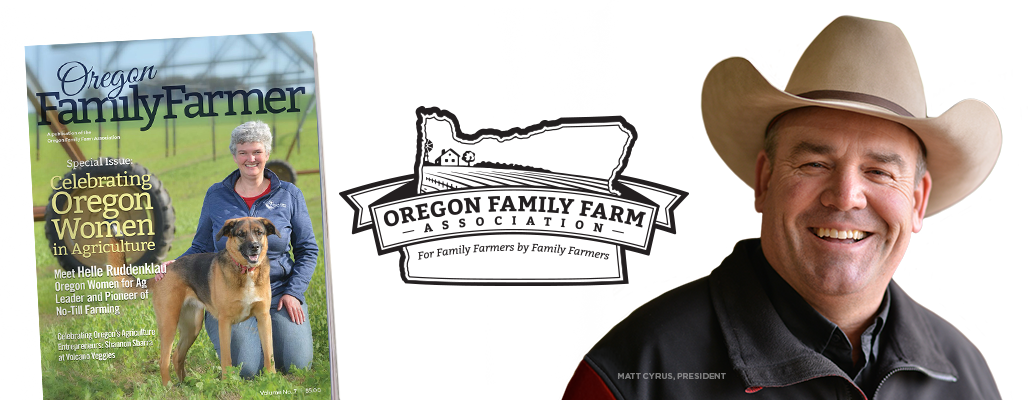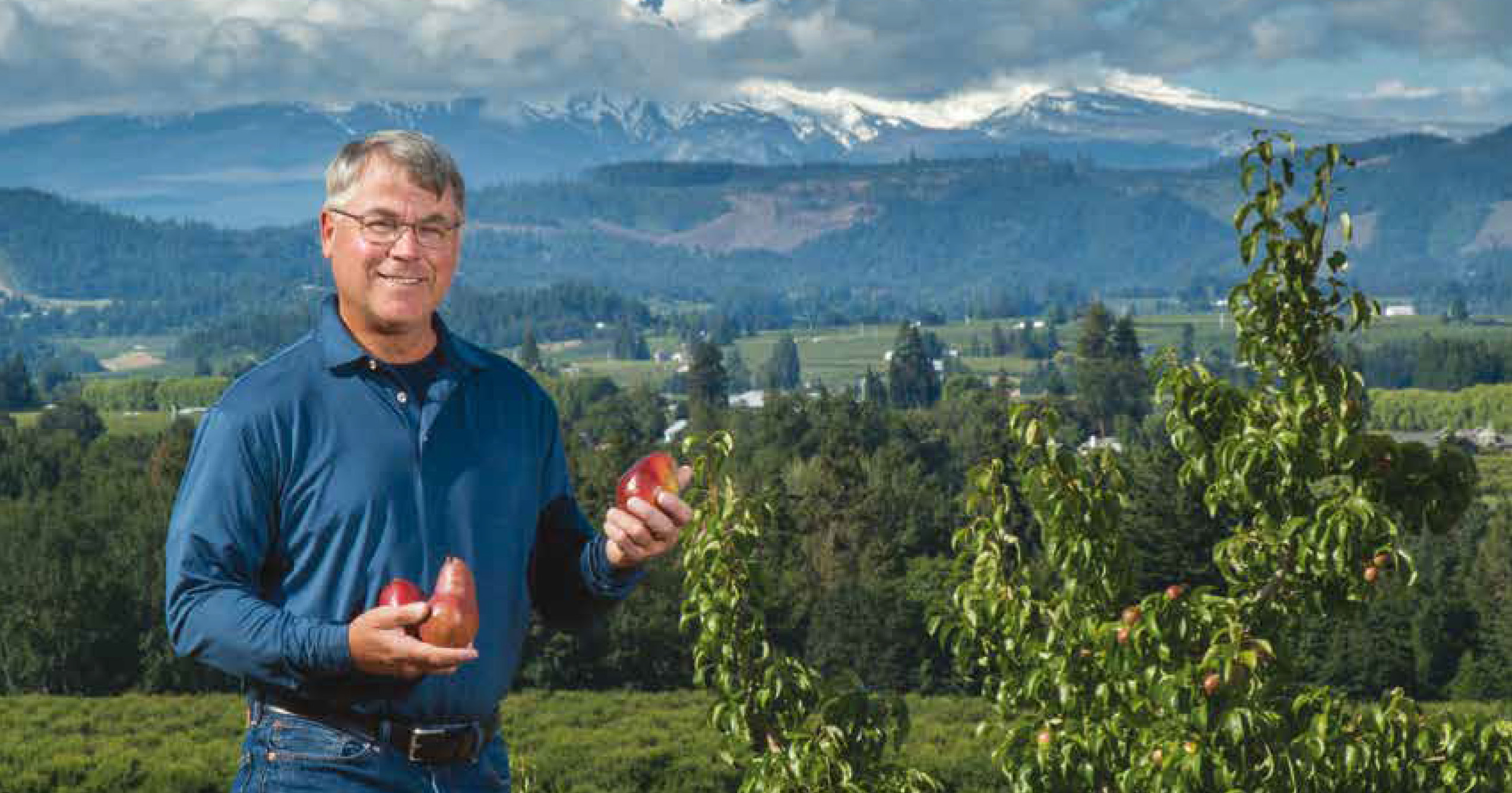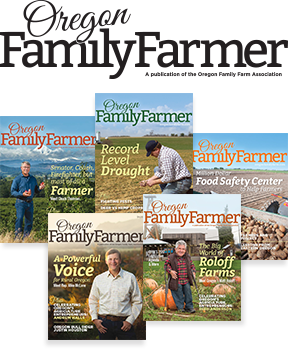BY NAOMI INMAN
Flanking the eastside of the Hood River Valley, and just to the south of Whiskey Creek Road, a fair stretch of Eastside Road winds along miles of winter pear orchards, dotted with vintage farm homes. A modest but dignified, crisp, white, salt-block home has stood as a Thomsen family residence for the better part of a century.
Ask Senator Chuck Thomsen, third generation pear farmer in the Hood River’s fruit valley, why he stayed on the family farm—a farm on which he is still only a tenant—and you’ll hear a thing or two about legacy. “It’s how you treat people, how you treat your kids, how you treat your workers down through the generations that makes it work. It’s about honesty and a good work ethic.” says Chuck. “ The decisions we make about our communities … all of it matters.”
His is a deep devotion to community. To a broad sense of family. And a rich heritage that stretches from the lumber mill and farm his great grandfather built, to the Pine Grove Schoolhouse that Grandpa Vic Thomsen built, and the pear grove that Grandpa Vic happened into while working at the Diamond Fruit Company. “
That’s how this whole family pear farm got started,” Chuck explains. “ My grandpa Vic grew up in this farming and timber community (on Thomsen Road). He worked for Diamond Fruit, the big pear growing cooperative here. The owner really like my grandpa. And when the owner of this farm retired to California he offered him this farm. That barn used to be a packing house, and they picked fruit back then in little wood boxes.”
Grandpa Vic married Daisy, and their only son Robert (Bob) is Chuck’s father. So Bob kept on at the farm and made a wise business decision that stands to this day. He hired the best foreman in the valley, Everett Long, who helped him take the farm from 50 acres to 160 as it stands today. “ When my dad took off for Wyoming and left me with the farm, I basically went to work for Everett Long,” said Chuck.
Farmer Chuck Thomsen talks about the generational farm from the kitchen table—the same tidy blue and white country kitchen where Grandma Daisy raised his dad, Bob, and where he often stomped in as a little boy from the guest house out back that he and his three sisters called home. He sipps a stiff cup of black coffee and leans over to stroke a rather adoring “foster kitten” he’s sending to a new home.
Out the back kitchen window he points to the house where he grew up, the old packing house, the barn, and the pear trees he and his sister would climb into and “just bawl.”
“When I was younger my dad would make us work. He’d wake us up in the middle of the night to light smudge pots. We drove tractors at ages 10 and 12. Sometimes my older sister and I would go and sit in a tree over there and just bawl. Thinning is hard and tedious work and it felt like no fun working in the orchards when all your friends were out playing.”
Chuck doesn’t remember resenting farm work too much. He enjoyed his family home, his three sisters, his grandparents, and his farming community. But it had its moments where it caused him to consider a different future.
When Chuck graduated from Hood River High School in 1975 and headed for Willamette University, he had one goal in mind “Get off the farm!” he says, with a quiet intensity.“ I originally went to Willamette University saying, ‘I’m going to do something else, I’m not going to farm.’ And that gave me incentive to do well in school.”
He graduated with a B.S. in Economics and Political Science at the height of the Carter years and a low in job prospects. So, he came back to Hood River where there was always work to do, meals to be had, and a closeknit community he cherished. “
When I came back my dad asked me, ‘are you going to farm?’ And I answered ‘I don’t know. I’ll give it a year.’ I said that just to get him off my back,” Chuck laughs.“ I was having a good time. There were a lot of friends around here my age. And I thought farming and working at Dad’s Chevy dealership was a fun job, even though it could be hard at times.”
Wouldn’t you know? Chuck’s dad very literally marked his son’s words. On the calendar.
“One year later, to the day, I was laying on the couch watching sports and my dad came in and said, ‘Well, it’s been a year. What’re you going to do?’”
So he answered glibly, “I’ll stay and farm.”
Within two years of that date, Chuck was married to Christy, a bright young schoolteacher he met at a basketball game in Goldendale, WA. And his dad? He was the one with a ticket to get off the farm. Bob Thomsen bought a cattle ranch in Wyoming and left Chuck with “pears for his heirs.”
That was in the early 80s. Thirty years later, the Thomsen family farm is a hard-working pear orchard with 160 acres of trees producing over 7,800 bins of Anjou, Bartlett, and Bosc pears sold on the fresh market. The farm is overseen by now second and third generations of foremen who are incredibly valued for their knowledge and loyalty. His dad still owns the farm. Chuck is still working for his dad. He’s still getting up in the middle of the night lighting smudge pots when the icy spring frosts threaten to kill the opening buds.
It seems Chuck developed the same work ethic.
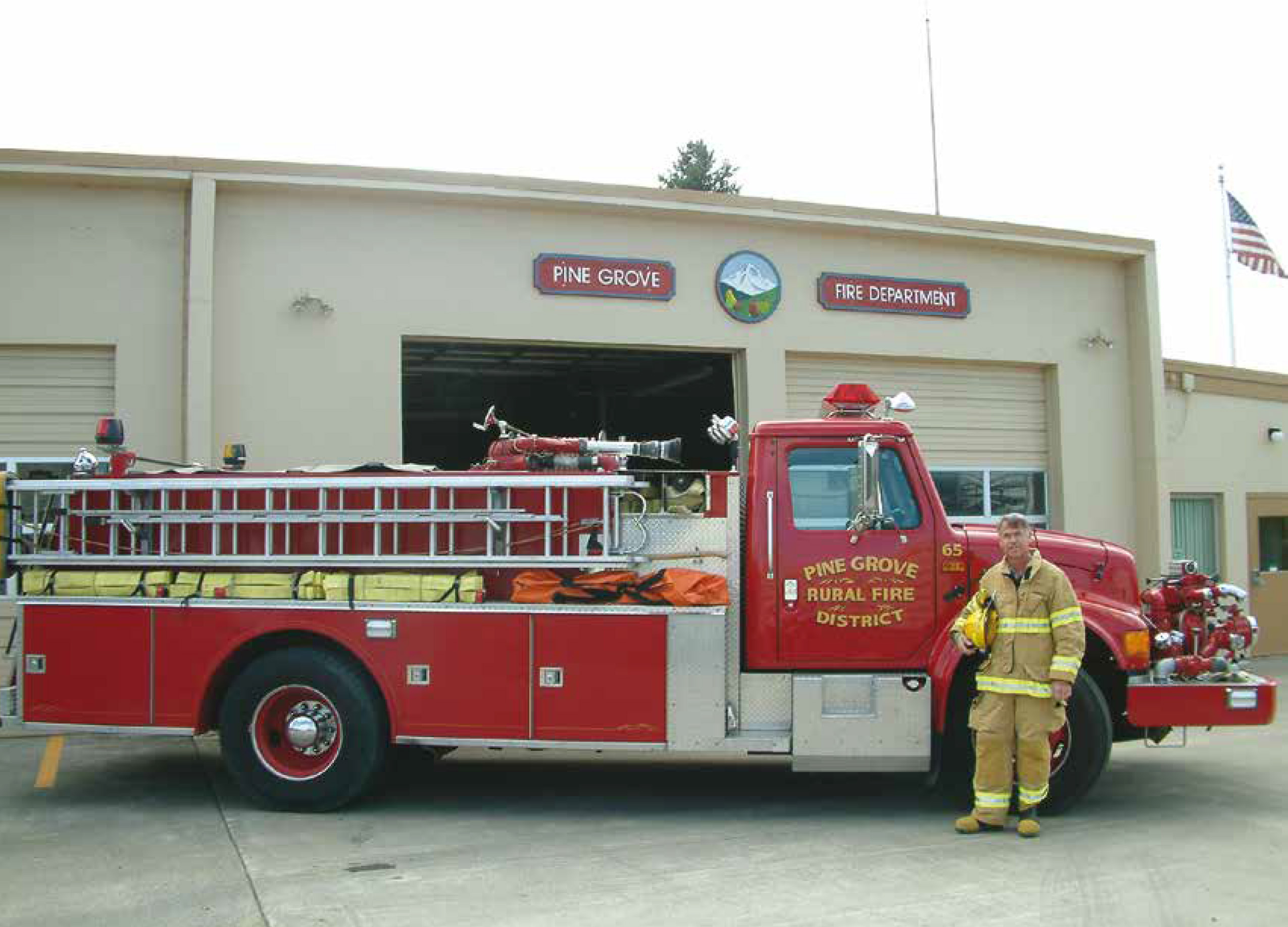 But what Chuck Thomsen has also cultivated in more than three decades is an unrelenting drive to serve his community and to be an encourager. For most of these 30-plus years, Chuck has been a volunteer firefighter with the Pine Grove Fire Department. For 14 years he coached his daughters’ school and Little League teams. Those are all just starters. Rotary Club president, numerous volunteer roles, and four years of appointment to the Hood River Planning Commission demonstrate just how intensely committed he is to his family, his community, and to working out policies that impact people where they live.
But what Chuck Thomsen has also cultivated in more than three decades is an unrelenting drive to serve his community and to be an encourager. For most of these 30-plus years, Chuck has been a volunteer firefighter with the Pine Grove Fire Department. For 14 years he coached his daughters’ school and Little League teams. Those are all just starters. Rotary Club president, numerous volunteer roles, and four years of appointment to the Hood River Planning Commission demonstrate just how intensely committed he is to his family, his community, and to working out policies that impact people where they live.
When a vacancy came up on the ballot for Hood River County Commissioner in 1994, he ran for the office and held that position until 2010. “When I ran for that spot and got elected, I never had an opponent after that, never put out a yard sign, never put an ad in the paper, never raised a dime, never did anything. People just knew me and I was a commissioner for 16 years.”
But when Ted Ferrioli approached Chuck to run for the State Senate seat (District 26) in 2009. He was reluctant. Even though he had been County Commissioner for 16 years, he had never actually run a campaign. All he’d ever done is sign-up for the ballot.
“I was however, ready for a new challenge,” Chuck remembers. And he’s quick to add, “I’m real lucky that I have a lot of good people and a foreman to run the farm when I’m gone. If I didn’t have Alfredo, I couldn’t do this job.”
Chuck the candidate had his work cut out for him in a minus-6 Democratic swing district. He agreed to run on one condition: he told Ferrioli, “I’ll run but I’m not going to lose. There’s no way my opponent can outwork me: I’m a farmer. I can get up any time of the morning and go to work.”
For eight months, and at great personal cost, in his words, “When I ran for state senate, I ran! And I ran and I ran.” He knocked on doors six days a week, often literally running between 100 doors a day from March to November. He knocked on 13,000 doors personally, and left thousands of personal handwritten notes on every door that went unanswered. He stayed up ‘til 2:00am writing handwritten thank you notes to every contributor. He took Mondays “off” to do the mounting paperwork and pay the bills and payroll. In a swing district, against a seated State Representative, he won 55% of the vote.
Senator Chuck Thomsen describes himself as a moderate thinker who is always looking for healthy compromise. “I’m willing to listen to everyone and try to find something in the middle that works,” he quips. He was on the budget committee for schools and effective in getting more funding for K-12.
The policies that threaten family farms, and especially generational family farms, still loom large and are cause for concern. Issues like paid sick leave for seasonal workers, inheritance taxes, minimum wage laws, and a legislature that is dominated by Portland-centric legislators—those issues can be killers for family farmers.
“I’ve always said that the best way to save agricultural land is to make sure farmers have a viable business. Don’t overregulate us. Don’t enact policies that hurt farmers. Because farmers work off of supply and demand,” he starts to explain.
One of the most striking things about Chuck Thomsen’s orchard, is his level of personal investment in his workers and his family.
More than 60 people live on the Thomsen farm where they are provided with housing, electricity and water—rent free. Many of these are long time seasonal workers and their families who work three or four months for the Thomsens, yet are free to work up and down the valley on neighboring farms. As Chuck drives me around to the homes and gardens set aside for his employees, he somewhat humbly avers “We have the best crew in the valley, the best foreman. That’s just how we take care of the people that work for us.”
It’s no wonder his current foreman, Alfredo, grew up here and now follows in his immigrant father’s footsteps (who is now retired and living on the property). Even Everett’s widow still lives in a house on the property. “It’s just what we do. We take care of them like family.”
From every perceivable angle, it’s easy to see that Chuck Thomsen is completely in his element. Following his passion for people, for families, for policy that affects people and families. Leading by serving—he’s lived it.
Don’t get me wrong. Chuck is pretty serious about having fun too. No “dull boy” here. His unimposing office is just off the kitchen, shelves are filled to the ceiling with a farm toy collection. I take notice. “Well, we kinda have a 30-year family hobby too,” he mentions. His daughter Meagan chimes in, “You want to see the basement?”
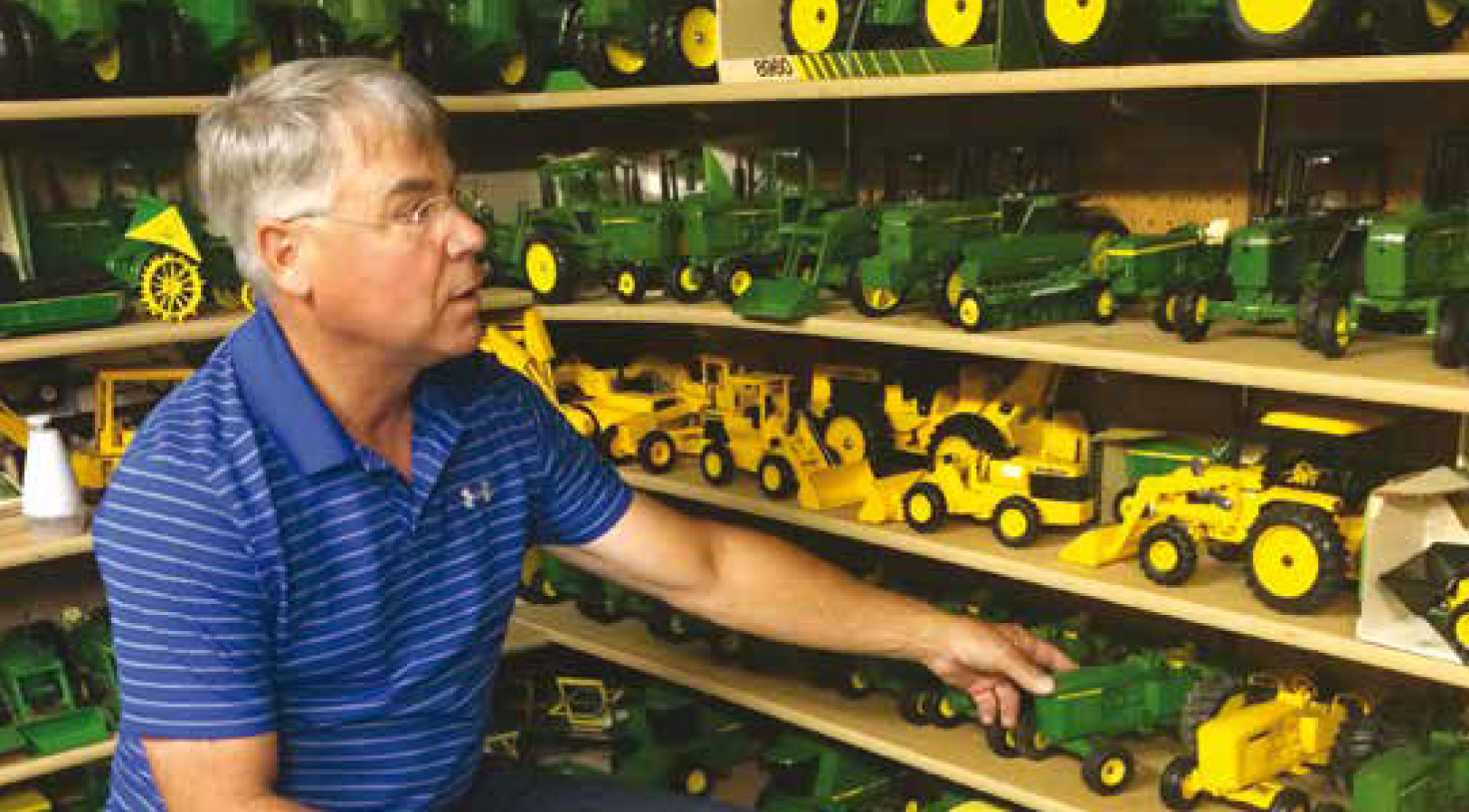 We head down the steep cellar-like stairs where a veritable museum of every year, make, and model of miniature tin tractors, farm equipment, barns, silos, figurines and what-not are carefully arranged. Catalogued on shelves from floor to ceiling around the perimeter of the room.
We head down the steep cellar-like stairs where a veritable museum of every year, make, and model of miniature tin tractors, farm equipment, barns, silos, figurines and what-not are carefully arranged. Catalogued on shelves from floor to ceiling around the perimeter of the room.
“Most every year we go as a family to the Iowa Toy Farm Show,” Meagan fondly interjects. I find it to be just one more layer of intrigue on this increasingly fanciful farmer.
Going back to his early memories of working for his dad, and “just bawling” with his sister in the pear trees, Chuck says he always vowed to raise his own kids, daughters Meagan and Mallory, not only to have a good work ethic, but to like farming. He put them to work four hours a day during the summer. They could choose the 8am or noon shift—but in either case they had to be punctual. “I wanted them to learn a work ethic. To learn what it was to be punctual, get up, and be at work on time.”
To this day, Mallory still loves the farming life. Meagan—not so much. She became a nurse. But she still lives on a Measure 37 claim on the family property. Meagan stopped in to see dad, I get to hear her story. She credits their dad for the intentional time he invested in them. Working alongside them in the pear orchards and coaching their ball teams.
“What’s your parting wisdom,” I ask. “Practical tips for keeping farming in the family.”
Suddenly, he’s a bit stumped.
“I don’t know? Do what you think is best and hope a little bit rubs off?” he questions. “You always hope at least one person in the family wants to take over, eventually. Will my daughters want to do it? Maybe. I don’t know. I want them to enjoy it.”
His resolve kicks back in. “You know, family farming is the greatest life! It’s a great way to raise your kids, to raise up a family and teach them a work ethic. To continue generationally isn’t always easy. It’s tough to mix business with family. So in family farming— part of it is staying in business, and part of it is staying a family.”
